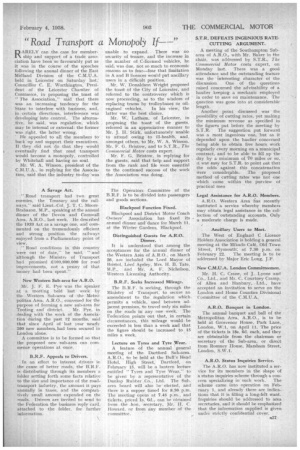"Road Transport a Monopoly If-
Page 25

If you've noticed an error in this article please click here to report it so we can fix it.
RARELY can the case for membership and support of a trade association have been so favourably put as it was in the course of -the speeches following the annual dinner of the East Midland Division of the C.M.U.A. held in Leicester on Saturday last.' Councillor C. E. Worthington, President of the Leicester Chamber of Commerce, in proposing the, toast of " The Association," said that there was an increasing tendency for the State to interfere with business, and, in certain directions, interference was developing into control. The alternative, he said, was regulation, which may be internal or external: the former was right, the latter wrong.
He appealed to all the members to back up and support their executives. If they did not go that they would eventually find that road transport would become a monopoly, controlled by Whitehall and having no soul.
Mr. W. A. Winson, president of the C.M.U.A., in replying for the Association, said that the industry to-day'"was unable to expand. There was no security of tenure, and the increase in the number of C-licensed vehicles, he said, was due, not so much to economic reasons as to fear—fear that limitation in A and B licences would put ancillary users in a difficult position.
Mr, W. Donaldson Wright proposed the toast of the City of Leicester, and referred to the controversy which is now proceeding, as to the wisdom of replacing trams by trolleybuses or oil engined vehicles, In his view, the latter was the best choice.
Mr. W. Latham, of Leicester, in proposing the toast of the guests, referred in an appreciative manner to Mr. J. H. Stirk, unfortunately unable to attend owing to ill-health, and, amongst others, to Mr. W. A. Winson, Mr. F. G. Bristow, and to S.T.R., The Commercial Motor costs expert.
Mr. F. 0, Bristow, in replying for the guests, said that help and support from the rank and file were essential to the continued success of the work the Association was doing. A meeting of the-Southampton Subarea of A.R.O., with Mr. Baker in the chair, was addressed by S.T.R., The Commercial Motor costs expert, on Monday last. There was a good attendance and the outstanding feature was the interesting character of the discussion. One of the questions raised concerned the advisability of a haulier keeping a mechanic employed in order to save on maintenance. The question was gone into at considerable length.
Another point discussed was the possibility of cutting rates, yet making the minimum revenue as specified in the figures put before the meeting by
S.T.R. The suggestion put forward was a most ingenious one, but as it depended upon the haulier concerned being able to obtain five hours work regularly every morning on a municipal contract, and to be able to fill up the day by a minimum of 70 miles or so, it was easy for S.T.R. to point out that the odds against this concatenation Were consider.i.cble. The proposed method of cutting rates was not one which came within the purview of practical men.


































